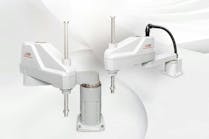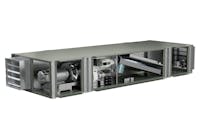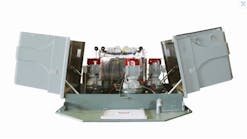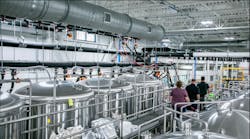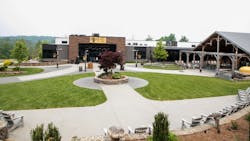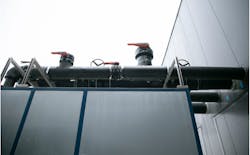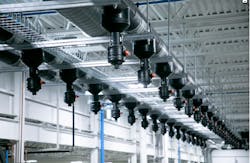By KATHERINE BONAMO
Twelve years ago, Tree House Brewing arrived on the craft beer scene with a bang. And by 2013, its now-famous “Julius” IPA had cracked Beer Advocate’s prized Top 250 List.
By 2020, Tree House was the largest brewer in Massachusetts outside Boston—without traditional distribution. To this day, the only way to drink Tree House beer is to collect or consume it on site, at one of five New England locations—and beer lovers continue to line up for the privilege.
This meteoric rise may look effortless from the sidelines, but hard work and hard decisions faced the brewers at every stage. Brewing for fun in your kitchen (as co-founder Nate Lanier did first) is one thing. Brewing for the local community in your friend’s barn is another, as the Tree House team discovered when they first started selling to the public.
And building your own full-scale professional brewing operation is a different level of effort entirely.
One part of the solution for Tree House was to streamline its physical expansion with COOL-FIT Pre-insulated Piping from GF Piping Systems.
Lightweight plastic piping insulated at the factory meant a fast, straightforward install for the contractor. Design advice and training support from GF meant that the brewers could concentrate on what they do best—dreaming up the next Tree House cult favorite.
Building to Last
Five years later, the brewery’s pre-insulated piping system underwent a significant expansion. In its early years, Tree House outgrew one base of operations after another. Their first commercial site, in Brimfield, MA (co-founder Damien Goudreau’s barn), attracted crowds so large they triggered pushback from the neighbors. Their second, in a family member’s garage in nearby Monson, was too cramped to let them keep up with rising demand.
By 2014, the four Tree House owners (Lanier, Goudreau, Dean Rohan, and Jonathan Weisbach) had taken the major decision to build their own 9,000-sq-ft premises, just down the road. But all too soon, the brewers needed even more room. In 2016, plans were in place to build Tree House’s current headquarters, on a far larger scale in every sense.
Clocking in at 55,000 sq ft, the new facility in Charlton, MA, would be more than six times the size of the old. Maximum brewing capacity would increase even more dramatically, by a factor of 18. Reflecting the economic heft of this growing concern, the $18.5M project was supported in part by a $7.7M bond from MassDevelopment.
Building again in such a short period of time—with the goal of creating a permanent base—gave Tree House the opportunity to reconsider every technical decision in its brewing operation. In this light, one important revision emerged: the choice of piping material for their cooling loop. Tree House had built its first cooling piping system from copper, traditionally regarded as a high-quality option.
However, insulating the metal pipes as needed for the glycol loop at Tree House proved more troublesome than expected. Condensation would build up between the pipes and the insulation, undermining efficiency and creating unwanted dripping.
To achieve better results, Tree House chose GF’s COOL-FIT Pre-Insulated Piping System for the glycol cooling loops in its new flagship brewhouse. The lighter weight of plastic piping and the design of GF’s joining system made installation significantly faster and less costly. Installing the insulation ahead of time under factory conditions simplified the project schedule, with no need for an insulating crew to follow the pipefitters.
The factory precision and modern materials also ensured excellent performance at Charlton with virtually no maintenance, even with the brewery’s chiller units located outdoors. When Tree House needed to expand the Charlton piping system in 2022, this track record made staying with COOL-FIT an easy decision.
“To save the labor time in insulating, to save the money in insulating, and have a product that’s plug and play—it was huge for us,” noted Tree House co-founder Dean Rohan — a former plumber by trade. “Also, it doesn’t rot, it doesn’t rust, and it doesn’t break.”
“Not One Leak Occurred”
Eric Sweet, President of Northeast Process Systems, Inc., handled the latest piping system expansion at Charlton. Explaining that he frequently installs COOL-FIT for brewery applications, Sweet noted the appeal of its thermal performance for this industry. “Any loss of temperature from the chiller to the furthest fermenting vessel is a potential for degraded product,” he pointed out. “They couldn’t maintain the low temperature on a consistent basis with any other piping system.”
Meanwhile, Sweet appreciated the system’s thoughtful design from his own point of view.
“The preprogrammed weld parameters and the barcode scanner made the joint sealing very simple and very reliable,” he explained. Proud to work with his son Tyler on the extensive effort (as his family’s fourth generation in the pipefitting business), Sweet reported satisfaction with the results: “We did probably close to 800 joints on this particular project, a good percentage of them probably 22 feet up in the air, and not one leak occurred. So that speaks for itself.”
GF had consulted with Tree House on the design, layout, and size of the expansion all along the way, a partnership role that Dean Rohan appreciates. Alluding to frequent support visits from GF technical personnel, Rohan noted that COOL-FIT “doesn’t just have a pamphlet or a website that you go to. It feels like we have someone on our side all the time.” From the installation point of view, Eric Sweet valued GF’s involvement as well: “The support that we got from GF Piping Systems was spot on.”
More Than Meets the Eye
Set high on a hilltop, Tree House Charlton overlooks acres of forest in a peaceful corner of central Massachusetts. The beauty of this location clearly helps make Tree House runs a pleasure for its customers. But as with many forms of art, a solid technical foundation lies behind what meets the eye — and the palate.
Creative inspiration was needed to produce Tree House’s award-winning beers — but so was engineering excellence in the brewhouse, backed by organizational commitment. If “craft” is where art and science meet, then nothing makes more sense than this craft brewer’s swift success. And for just the same reason, nothing is more likely than continued growth to come.
##########
The author writes on topics in architecture, engineering, and construction for publications throughout the U.S.
